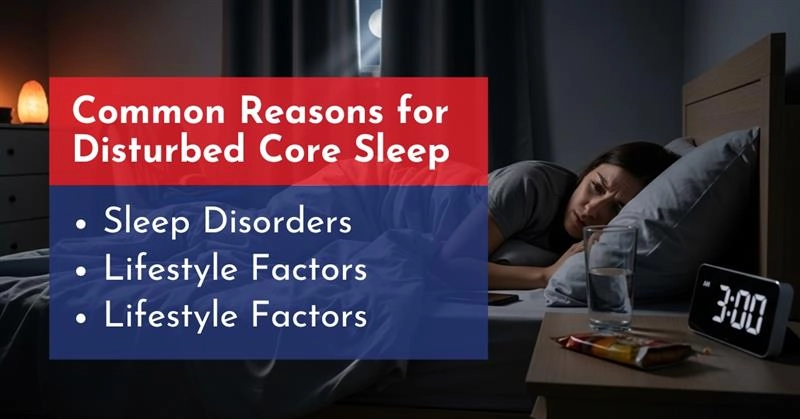Table of content
- What is Core Sleep?
- Core Sleep and the Sleep Cycle
- Why Core Sleep is Important for Diabetes
- Common Reasons for Disturbed Core Sleep
- How Core Sleep Affects Blood Sugar Levels
- Health Consequences of Poor Core Sleep
- Tracking Sleep and Glucose Together
- Can You Survive on Core Sleep Only?
- Does Diabetes Affect Core Sleep?
- The Role of CGM Devices in Better Sleep
- Conclusion:
- Frequently Asked Questions
Core sleep is the most vital part of your nighttime rest. It typically encompasses deep sleep (slow-wave sleep) and some REM sleep. These phases are essential for brain restoration, muscle repair, and regulating key functions like insulin sensitivity and glucose metabolism. In contrast to light sleep, which is prone to interruptions, core sleep delivers the restorative advantages your body requires—even without finishing the complete sleep cycle.
As per a report shared on Wikipedia, researchers from the University of Chicago Medical Centre followed 11 young, healthy men for 16 consecutive nights. For the first 3 nights, they slept the normal 8 hours, then for about 4 hours the next 6 nights, and the next 7 nights they slept even longer, spending 12 hours in bed.
What is Core Sleep?
Core sleep refers to the most essential portion of your nightly rest. It usually includes deep sleep (slow-wave sleep) and some REM sleep. These stages are critical for restoring the brain, repairing muscles, and regulating important functions like insulin sensitivity and glucose metabolism.
Unlike light sleep, which is more easily disrupted, core sleep ensures your body gets the restorative benefits it needs—even if you don’t complete the full sleep cycle.
Core Sleep and the Sleep Cycle
Sleep is structured in cycles that repeat several times during the night. Each cycle includes:
- Light Sleep (NREM Stage 1 & 2) – Transition phase where your body starts to relax.
- Deep Sleep (NREM Stage 3) – Also known as slow-wave sleep, where muscle repair, growth, and hormone regulation occur.
- REM Sleep (Rapid Eye Movement) – The stage linked to dreaming, memory consolidation, and emotional processing.
Core sleep is made up of the most restorative parts: deep sleep and some REM sleep. Missing out on these stages can impact your circadian rhythm, brain activity, and overall sleep architecture.
Why Core Sleep is Important for Diabetes
For individuals managing diabetes, core sleep is not just about feeling rested—it directly affects blood sugar control.
- Poor sleep reduces insulin sensitivity, making it harder for your body to process glucose.
- Sleep deprivation increases cortisol levels (stress hormone), which can trigger glucose spikes.
- Restorative sleep supports the immune system and lowers the risk of complications linked to diabetes.
The American Academy of Sleep Medicine (AASM) recommends 7–9 hours of sleep for adults, but the quality of your sleep (core sleep) is more critical than quantity.
Common Reasons for Disturbed Core Sleep
Several factors can disrupt core sleep:
- Sleep Disorders: Conditions like insomnia and sleep apnea can fragment sleep architecture, reducing the duration of SWS.
- Lifestyle Factors: Irregular sleep schedules, excessive caffeine or alcohol intake, and high levels of stress can negatively impact sleep quality.
- Medical Conditions: Chronic illnesses, including diabetes and cardiovascular diseases, can interfere with sleep patterns. For example, high blood sugar can disrupt your sleep by increasing the number of visits to the toilet.

How Core Sleep Affects Blood Sugar Levels
Research shows that lack of core sleep can lead to hyperglycemia (high blood sugar) by disrupting hormone regulation. On the other hand, good sleep improves:
- Cognitive function → making better decisions around diet and medication.
- Hormone balance → stabilizing insulin release.
- Energy levels → supporting physical activity, which improves blood sugar control.
Many people using CGM devices notice that nights with poor sleep often show glucose fluctuations the next day.
Health Consequences of Poor Core Sleep
Inadequate core sleep has been linked to various health issues:
- Metabolic Dysregulation: Poor sleep can impair glucose metabolism and insulin sensitivity, increasing the risk of type 2 diabetes.
- Obesity: Disrupted sleep affects hormones that regulate appetite, leading to increased hunger and potential weight gain.
- Cardiovascular Diseases: Chronic sleep deprivation is associated with hypertension and other heart-related conditions.
Continuous Glucose Monitoring helps in lowering A1C levels. The continuous monitoring has been made possible with the help of continuous glucose monitors, commonly known as CGMs. Everything you want to know about CGMs.
Tracking Sleep and Glucose Together
Today’s technology makes it possible to track both sleep and glucose. Devices like Fitbit, Oura Ring, or Apple Watch monitor sleep cycles, while Dexcom G7 (3 Pack), Freestyle Libre 3 Plus, or Omnipod 5 G6 continuously measure blood sugar.
By comparing data, you can see:
- How poor sleep leads to overnight glucose spikes.
- If nighttime hypoglycemia is disrupting your sleep.
- The impact of bedtime routines on glucose levels.
Pairing CGM data with sleep tracking gives people with diabetes powerful insights into their health.
Can You Survive on Core Sleep Only?
Some people wonder if getting only core sleep—without a full night’s rest—is enough. While you can function on just core sleep, it’s not sustainable long-term.
- Short-term → You may feel alert and energetic.
- Long-term → You risk sleep disorders, weakened immunity, and poor diabetes control.
For people with diabetes, missing full cycles of sleep can worsen insulin resistance and increase risks of complications.
Does Diabetes Affect Core Sleep?
Yes, diabetes can adversely affect core sleep:
- Peripheral Neuropathy: Caused by high blood sugar levels, this nerve pain can lead to discomfort during sleep.
- Nocturia: Frequent urination is a common sign of diabetes. Needing to pee during the 6 or 8 bed hours can disrupt sleep continuity.
- Restless Leg Syndrome: Common in diabetics, leading to difficulty falling and staying asleep.
Addressing these issues is crucial, as poor sleep can further impair glucose metabolism, creating a vicious cycle.
The Role of CGM Devices in Better Sleep
CGM devices play a vital role in helping people with diabetes get better sleep:
- Dexcom G7 → Alerts for low or high glucose during the night.
- Freestyle Libre 3 → Continuous, discreet monitoring without fingersticks.
- Omnipod 5 G6 → Automated insulin delivery that adjusts in real-time, reducing overnight lows.
By preventing dangerous glucose swings, CGMs help users sleep more peacefully and achieve more restorative core sleep.
Conclusion:
Core sleep is the foundation of healthy rest—and for people with diabetes, it’s also a foundation for stable blood sugar, improved insulin sensitivity, and overall well-being. By combining healthy sleep habits with CGM monitoring, you can protect your health, prevent nighttime glucose fluctuations, and feel more energized each day.
One sleep cycle takes approximately 90 to 110 minutes. Usually completed during the first 3 cycles of sleep, core sleep primarily refers to the deepest stage of sleep, which is also known as slow wave sleep (typically stages 3 and 4 of non-REM sleep) and is considered the most restorative part of the sleep cycle.
Frequently Asked Questions
How many hours of core sleep does an adult with diabetes need?
Most adults, including those with diabetes, need around 4–6 hours of core sleep within a full 7–9 hour sleep schedule for optimal health.
2. Is core sleep the same as deep sleep?
No. Core sleep includes both deep sleep (slow-wave sleep) and part of REM sleep, making it broader than just deep sleep.
3. Can lack of core sleep increase the risk of diabetes complications?
Yes. Poor core sleep raises stress hormones, reduces insulin sensitivity, and may contribute to long-term diabetes complications like neuropathy and cardiovascular issues.
4. Does blood sugar affect how much core sleep you get?
Yes. High blood sugar can make it harder to enter deep sleep, while low blood sugar may cause nighttime awakenings, reducing total core sleep.
Can CGM devices help improve core sleep quality?
Yes. CGM devices like Dexcom G7 and Freestyle Libre 3 alert users to glucose fluctuations at night, helping prevent disruptions that cut into core sleep.
Is it possible to train your body to get more core sleep?
Yes. Following good sleep hygiene—such as a consistent schedule, low-stress routines, and limiting blue light—can increase the proportion of core sleep you get each night.
What lifestyle changes improve both core sleep and blood sugar?
Balanced nutrition, regular exercise, stress reduction, and consistent use of CGM devices can all improve sleep quality while keeping blood sugar in check.







Write a comment
Your email address will not be published. All fields are required